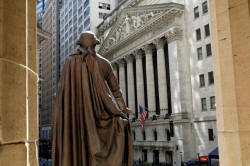Investing with 'green' ratings? It's a gray area
 Send a link to a friend
Send a link to a friend
 [June 26, 2017]
By Ross Kerber and Michael Flaherty [June 26, 2017]
By Ross Kerber and Michael Flaherty
BOSTON/NEW YORK (Reuters) - Investors
betting trillions on ethically-appealing stocks may not be getting all
they expect.
Buying into companies based on environmental, social and governance
factors, has become a hot trend on Wall Street, spawning a new industry
that sells investors company ratings based on those factors and funds
dedicated to rated companies. However, some investors and funds may rely
too much on the scores of one rating firm, said Dan Hanson, a portfolio
manager at Jarislowsky Fraser Global Investment Management.
"The scores are in some cases being used in a way they are not really
designed for," Hanson said. "It's problematic to bolt them on to an
investment process."
There are no set criteria for who is bad and who is good and so-called
ESG ratings vary widely, meaning investors may be less protected than
they think, for example, from a scandal over labor practices or board
pay.
"We don't have a common vernacular," said Asha Mehta, director of
responsible investing at Acadian Asset Management in Boston.
Sustainability analysis firm CSRHub compared such ratings given to
companies in the S&P Global 1200 index by two leading firms in the field
- a division of MSCI Inc, and Toronto-based Sustainalytics - and found
they had a correlation coefficient of 0.32, a relatively weak level.

Credit ratings, in contrast, are closely aligned, with the comparable
figure for Moody’s and S&P ratings of around 0.9, according to research
by Northern Illinois University finance professor Lei Zhou.
The difference is that credit ratings rely on financial disclosures
while the sustainability ratings may reflect different weightings given
to factors such as workers' rights, emissions, or responses to events
such as an oil spill or product failure.
Electric car maker Tesla, for example, has received a top AAA score from
MSCI, but a middling grade from Sustainalytics, below that of
traditional automakers Ford Motor Co and General Motors , partly because
Tesla does not release carbon emissions data for its manufacturing
plants.
Tesla declined to comment.
In interviews, a dozen professional investors and company executives
told Reuters they were frustrated by the lack of common standards, even
as many praised the work of the ratings firms individually.
COMMON LANGUAGE
One remedy, they say, would be to adopt a common language and reporting
requirements. Starting next year, the European Union will require
companies to report on their efforts in such areas as the environment
and social responsibility. In the United States, a small group of
companies, such as JetBlue Airways Corp, has embraced voluntary
disclosures suggested by the Sustainability Accounting Standards Board,
an independent organization.

As more and more investors recognize the long-term financial benefits of
good corporate governance and sustainable policies, the need for uniform
criteria becomes more pressing.
The Forum for Sustainable and Responsible Investment estimates that more
than $8 trillion was invested by U.S. fund managers who incorporated at
least some of such criteria in their strategy, up from $1.4 trillion in
2012. CSRHub counts 17 firms and organizations that track in some form
corporate adherence to environmental, social and governance standards,
including Thomson Reuters, the parent company of Reuters.
[to top of second column] |

The New York Stock Exchange is seen from the steps of Federal Hall
behind a Statue of former U.S. President George Washington in New
York City, U.S., May 17, 2017. REUTERS/Brendan McDermid

At their best, rating firms can help investors avoid losses. For instance, both
MSCI and Sustainalytics raised governance concerns about Volkswagen AG months
before the German automaker admitted to cheating on U.S. diesel emissions tests
in September 2015. “They absolutely called that right,” said Seb Beloe, head of
sustainability research at WHEB Asset Management in London. But there is also a
risk that they will miss red flags because non-financial information is less
readily available and open to interpretation.
Simon MacMahon, who oversees ESG research at Sustainalytics, acknowledged
sustainability can be difficult to define. "We're talking about a whole host of
issues here."
Yet Linda-Eling Lee, head of ESG research at MSCI, said few executives object to
its findings. "It's only a handful of companies where we have a back and forth,"
she said.
Some companies take advantage of the disparities to focus on ratings that are
more favorable, said Robert Fernandez, director of ESG research for Breckinridge
Capital Advisors in Boston.
"You can certainly see how it's a concern that they have divergent views," he
said.
The absence of a common standard has not stopped Wall Street. While larger
investment firms usually combine ratings with their own research, some funds are
built largely off ratings, even if sponsors acknowledge they may be imperfect.
For example, a disclosure from one of the largest, the $866 million iShares MSCI
KLD 400 Social ETF, run by BlackRock and based on MSCI ratings notes among its
risk factors the chance MSCI might not pick companies with the right "ESG
characteristics."

Lynn Blake, a top investment officer at State Street Global Advisors, said the
divergence in ratings, while warranting some caution, may ultimately make little
difference for large, diverse portfolios. "We believe they are 'good enough,'
particularly for broad universe index funds," Blake said via e-mail. The case of
Tesla, shows how ratings can reflect differences in approach rather than any
flaws in analysis or data. In its report, Sustainalytics acknowledged CEO Elon
Musk's goal of making Tesla's "Gigafactory" built in Nevada entirely powered by
renewable energy. Yet it still gave the company an overall score of 55 out of
100 for not disclosing data on the carbon emissions from its automaking
operations. "Their lack of corporate sustainability reporting is kind of a
shame, especially considering their main product is a low-carbon product,"
Sustainalytics' MacMahon said. Similarly, MSCI rated Tesla 5.3 on a 10-point
scale for "carbon emissions," including its own operations. But that score did
not dent Tesla's overall top AAA grade because MSCI gave more weight to other
factors, such as emissions of Tesla cars, said MSCI's Lee.
Ultimately the firm decides on what to focus on to make the rating more
meaningful for investors, she said. "You could give three percent (importance)
to lots of issues and at the end of the day, everything averages out," Lee said.
(Reporting by Ross Kerber and Michael Flaherty; Editing by Carmel Crimmins and
Tomasz Janowski)
[© 2017 Thomson Reuters. All rights
reserved.] Copyright 2017 Reuters. All rights reserved. This material may not be published,
broadcast, rewritten or redistributed. |